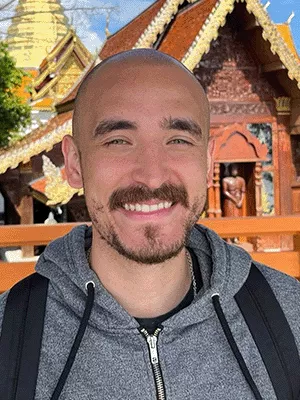
OVPR: What was the focus of your PhD?
Francisco Gómez Jiménez: My PhD focused on understanding what cognitive, biodemographic, and psychodevelopmental traits characterize same-sex attracted males across cultures, as well as understanding male same-sex sexuality from an evolutionary perspective. This research was mainly conducted among the Istmo Zapotec of Oaxaca, Mexico, where I studied same-sex attracted males who identify as muxes—a third gender category that is distinct from men and women.
OVPR: What skill do you think is most important for a PhD to learn before starting a PDF?
FGJ: Becoming an academic often involves being exposed to criticism and rejection. These experiences can be challenging as they often lead to feelings of incompetence and self-doubt. Nevertheless, they are inevitable obstacles that every academic must overcome. Thus, the ability to take criticism and rejection as an opportunity to learn and improve upon one’s work is arguably one of the most important skills a PhD should develop. Doing so will ultimately enable any aspiring academic to become a more refined scientist and facilitate the road ahead.
OVPR: What is the aim of your current research?
FGJ: My current research aims are to understand how children’s gender-related thinking (e.g., gender stereotyping and categorization) and psychosocial wellbeing varies across cultural contexts. Specifically, my research compares cisgender and gender-diverse children in Canada, where gender is typically understood and expressed in a binary manner (e.g., man/woman), to those in Thailand, where gender-diverse individuals self-identify as members of non-binary genders, are highly visible, and are socially accepted. In doing so, my research provides significant insight into how such cultural acceptance and visibility affect children’s understanding of gender as a social category, and gender-diverse children’s self-concepts and psychosocial development.
OVPR: Why did you choose UTM for your PDF?
FGJ: UTM houses many world-leading researchers who are experts in their respective fields. Among these, is Dr. Doug VanderLaan, who is one of the few people in the world with expertise in both child gender development and cross-cultural field research with non-Western gender-diverse children and adults. Moreover, Dr. VanderLaan’s lab is part of the UTM Infant and Child Studies Centre, through which he has access to a broad community of families to interview for developmental research. Because of this, working with Dr. VanderLaan at UTM was the best choice for me to acquire the necessary experiences needed to develop a programme of research focused on childhood gender development across cultures.
OVPR: What is one advantage you feel you gained through the UTM Postdoctoral Fellowship Award Program?
FGJ: My time as Postdoctoral Fellow at UTM has been rich with opportunities to grow as a researcher. Unique among these is the opportunity to expand my research network by engaging in international research collaboration. Through Dr. VanderLaan’s research lab, I have worked with researchers around the globe who are experts in gender and childhood development. Through our collective work, we aim to expand the generalizability of our findings regarding children’s gender development. This level of collaboration is something I could only dream of when I began my journey as a cross-cultural psychologist. Thus, I am grateful to Dr. Doug VanderLaan and UTM for giving me the opportunity to realize my academic dreams.
OVPR: What is your aspiration after completing this fellowship?
FGJ: After completing my fellowship, I will be starting a Lecturer position at Brunel University London in the UK, where I will continue my cross-cultural research on gender and sexuality.
OVPR: What do you do outside of research to unwind?
FGJ: As a native Puerto Rican, I like to unwind in the same way any stereotypical Puerto Rican would: listening and dancing to salsa music, drinking a cafecito with friends, and talking with my mother to learn all the latest bochinche (i.e., gossip) about friends and family.
